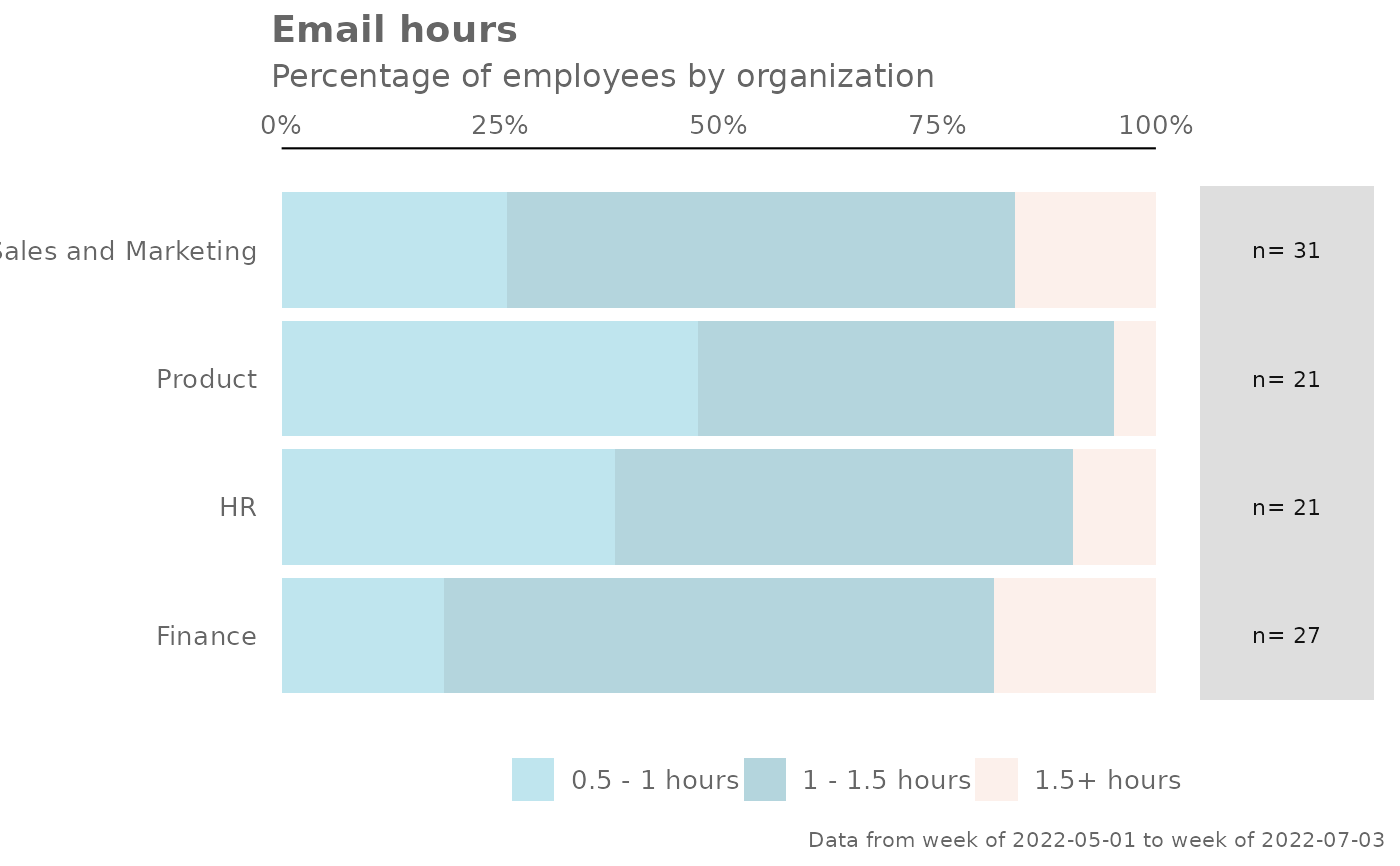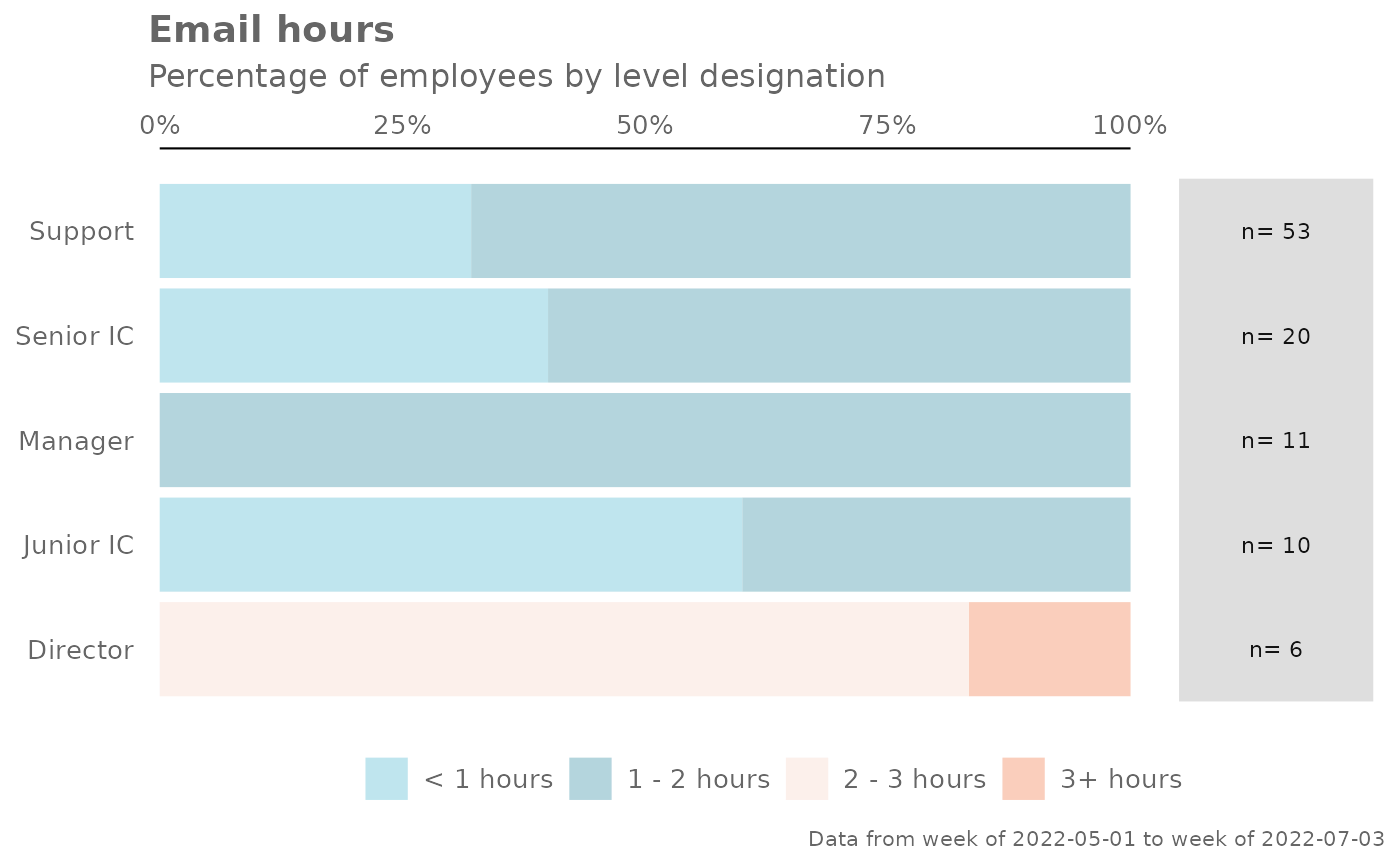Analyze Email Hours distribution. Returns a stacked bar plot by default. Additional options available to return a table with distribution elements.
Usage
email_dist(
data,
hrvar = "Organization",
mingroup = 5,
return = "plot",
cut = c(0.5, 1, 1.5)
)Arguments
- data
A Standard Person Query dataset in the form of a data frame.
- hrvar
String containing the name of the HR Variable by which to split metrics. Defaults to
"Organization". To run the analysis on the total instead of splitting by an HR attribute, supplyNULL(without quotes).- mingroup
Numeric value setting the privacy threshold / minimum group size. Defaults to 5.
- return
String specifying what to return. This must be one of the following strings:
"plot""table"
See
Valuefor more information.- cut
A numeric vector of length three to specify the breaks for the distribution, e.g. c(10, 15, 20)
Value
A different output is returned depending on the value passed to the return argument:
"plot": 'ggplot' object. A stacked bar plot for the metric."table": data frame. A summary table for the metric.
See also
Other Visualization:
afterhours_dist(),
afterhours_fizz(),
afterhours_line(),
afterhours_rank(),
afterhours_summary(),
afterhours_trend(),
collaboration_area(),
collaboration_dist(),
collaboration_fizz(),
collaboration_line(),
collaboration_rank(),
collaboration_sum(),
collaboration_trend(),
create_bar(),
create_bar_asis(),
create_boxplot(),
create_bubble(),
create_dist(),
create_fizz(),
create_inc(),
create_line(),
create_line_asis(),
create_period_scatter(),
create_rank(),
create_rogers(),
create_sankey(),
create_scatter(),
create_stacked(),
create_tracking(),
create_trend(),
email_fizz(),
email_line(),
email_rank(),
email_summary(),
email_trend(),
external_dist(),
external_fizz(),
external_line(),
external_rank(),
external_sum(),
hr_trend(),
hrvar_count(),
hrvar_trend(),
keymetrics_scan(),
meeting_dist(),
meeting_fizz(),
meeting_line(),
meeting_rank(),
meeting_summary(),
meeting_trend(),
one2one_dist(),
one2one_fizz(),
one2one_freq(),
one2one_line(),
one2one_rank(),
one2one_sum(),
one2one_trend()
Other Emails:
email_fizz(),
email_line(),
email_rank(),
email_summary(),
email_trend()
Examples
# Return plot
email_dist(pq_data, hrvar = "Organization")
 # Return summary table
email_dist(pq_data, hrvar = "Organization", return = "table")
#> # A tibble: 7 × 3
#> group `1.5+ hours` Employee_Count
#> <fct> <dbl> <int>
#> 1 Finance 1 68
#> 2 HR 1 33
#> 3 IT 1 68
#> 4 Legal 1 44
#> 5 Operations 1 22
#> 6 Research 1 52
#> 7 Sales 1 13
# Return result with a custom specified breaks
email_dist(pq_data, hrvar = "LevelDesignation", cut = c(1, 2, 3))
# Return summary table
email_dist(pq_data, hrvar = "Organization", return = "table")
#> # A tibble: 7 × 3
#> group `1.5+ hours` Employee_Count
#> <fct> <dbl> <int>
#> 1 Finance 1 68
#> 2 HR 1 33
#> 3 IT 1 68
#> 4 Legal 1 44
#> 5 Operations 1 22
#> 6 Research 1 52
#> 7 Sales 1 13
# Return result with a custom specified breaks
email_dist(pq_data, hrvar = "LevelDesignation", cut = c(1, 2, 3))

